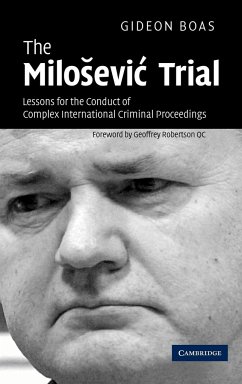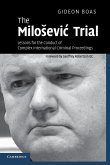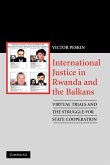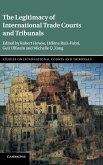This book examines what lessons can be learnt from the Milo?evic trial.
When Slobodan Miloševic died in the United Nations Detention Unit in The Hague over four years after his trial had begun, many feared - and some hoped - that international criminal justice was experiencing some sort of death itself. Yet the Miloševic case, the first trial of a former head of state by a truly international criminal tribunal and one of the most complex and lengthy war crimes trials in history, stands for much in the development and the future of international criminal justice, both politically and legally. This book, written by the senior legal advisor working for the Trial Chamber, analyses the trial to determine what lessons can be learnt that will improve the fair and expeditious conduct of complex international criminal proceedings brought against former heads of state and senior political and military officials, and develops reforms for the future achievement of best practice in international criminal law.
Review quote:
'… Mr Boas's criticism proceeds from an analysis that is both expert and from the inside: he was the senior legal adviser to the trial judges, sitting in court for four years, from the day on which the prosecution opened to the day on which the trial collapsed. He shows the trial's failings, precisely and irrefutably, and his insight must inform and instruct the future development of international justice. The lessons he draws will be pondered in other courts trying truculent defendants, most notably in the International Criminal Court now taking shape in The Hague.'
Geoffrey Robertson QC
Table of contents:
Introduction; Part I. Fair and Expeditious International Criminal Trials: 1. Introduction; 2. Fair trial rights; 3. Expeditious trials; 4. Application and interpretation of human rights by the ICTY; Part II. The Prosecution Case in Miloševic - Getting Off on the Wrong Foot: 5. Content and scope of the Miloševic indictments; 6. Pleading practice and problems with the Miloševic indictments; 7. Joinder of the Milo?evic indictments; 8. Rule 98bis (judgement of acquittal) decision; 9. Conclusion; Part III. Case Management Challenges in the Milo?evic Trial: 10. Managing the Milo?evic case; 11. Case management principles in national and international criminal law; 12. Conclusion; Part IV. Representation and Resource Issues in the Miloševic Case: 13. Self-representation in international criminal law - limitations and qualifications on that right; 14. Resources and facilities available to Miloševic; 15. Conclusion; Part V. Conclusions: 16. The prosecution case must be focused, comprehensible and manageable; 17. The future of case management in complex international criminal law cases; 18. Managing resource and representation issues in complex international criminal law cases; 19. The need for a new appellate jurisdiction for international criminal law; 20. After Miloševic: the future of complex international criminal trials.
Hinweis: Dieser Artikel kann nur an eine deutsche Lieferadresse ausgeliefert werden.
When Slobodan Miloševic died in the United Nations Detention Unit in The Hague over four years after his trial had begun, many feared - and some hoped - that international criminal justice was experiencing some sort of death itself. Yet the Miloševic case, the first trial of a former head of state by a truly international criminal tribunal and one of the most complex and lengthy war crimes trials in history, stands for much in the development and the future of international criminal justice, both politically and legally. This book, written by the senior legal advisor working for the Trial Chamber, analyses the trial to determine what lessons can be learnt that will improve the fair and expeditious conduct of complex international criminal proceedings brought against former heads of state and senior political and military officials, and develops reforms for the future achievement of best practice in international criminal law.
Review quote:
'… Mr Boas's criticism proceeds from an analysis that is both expert and from the inside: he was the senior legal adviser to the trial judges, sitting in court for four years, from the day on which the prosecution opened to the day on which the trial collapsed. He shows the trial's failings, precisely and irrefutably, and his insight must inform and instruct the future development of international justice. The lessons he draws will be pondered in other courts trying truculent defendants, most notably in the International Criminal Court now taking shape in The Hague.'
Geoffrey Robertson QC
Table of contents:
Introduction; Part I. Fair and Expeditious International Criminal Trials: 1. Introduction; 2. Fair trial rights; 3. Expeditious trials; 4. Application and interpretation of human rights by the ICTY; Part II. The Prosecution Case in Miloševic - Getting Off on the Wrong Foot: 5. Content and scope of the Miloševic indictments; 6. Pleading practice and problems with the Miloševic indictments; 7. Joinder of the Milo?evic indictments; 8. Rule 98bis (judgement of acquittal) decision; 9. Conclusion; Part III. Case Management Challenges in the Milo?evic Trial: 10. Managing the Milo?evic case; 11. Case management principles in national and international criminal law; 12. Conclusion; Part IV. Representation and Resource Issues in the Miloševic Case: 13. Self-representation in international criminal law - limitations and qualifications on that right; 14. Resources and facilities available to Miloševic; 15. Conclusion; Part V. Conclusions: 16. The prosecution case must be focused, comprehensible and manageable; 17. The future of case management in complex international criminal law cases; 18. Managing resource and representation issues in complex international criminal law cases; 19. The need for a new appellate jurisdiction for international criminal law; 20. After Miloševic: the future of complex international criminal trials.
Hinweis: Dieser Artikel kann nur an eine deutsche Lieferadresse ausgeliefert werden.
‘… Mr Boas’s criticism proceeds from an analysis that is both expert and from the inside: he was the senior legal adviser to the trial judges, sitting in court for four years, from the day on which the prosecution opened to the day on which the trial collapsed. He shows the trial’s failings, precisely and irrefutably, and his insight must inform and instruct the future development of international justice. The lessons he draws will be pondered in other courts trying truculent defendants, most notably in the International Criminal Court now taking shape in The Hague.’ Geoffrey Robertson QC








